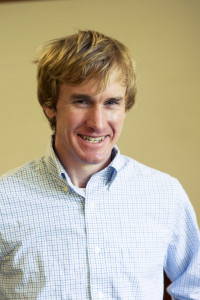The Chemistry Department at Houghton College hired Doctor Michael Selig as visiting professor for the academic year. Selig was selected through a process that began in the Spring of 2015 and came to completion this past August.
 He quickly transitioned into his first semester of teaching from defending his doctoral thesis in late August. Fellow chemistry professor Doctor John Rowley likened such an experience to, “writing a book one week and teaching someone to read the next.” The change has been made easier by Selig’s familiarity with the area. He grew up in Buffalo and had spent time in Rushford. “Summers in the area, at the lake, on boats, with campfires, clay pits, and visits to the bog at Moss Lake have made this area a special one in my heart. Despite that, I had never been to the Houghton campus until my interview and I will say I was pleasantly surprised to find such a hidden gem in an area that I had always held in my heart a special one,” he commented.
He quickly transitioned into his first semester of teaching from defending his doctoral thesis in late August. Fellow chemistry professor Doctor John Rowley likened such an experience to, “writing a book one week and teaching someone to read the next.” The change has been made easier by Selig’s familiarity with the area. He grew up in Buffalo and had spent time in Rushford. “Summers in the area, at the lake, on boats, with campfires, clay pits, and visits to the bog at Moss Lake have made this area a special one in my heart. Despite that, I had never been to the Houghton campus until my interview and I will say I was pleasantly surprised to find such a hidden gem in an area that I had always held in my heart a special one,” he commented.
The bulk of Selig’s research is in analyzing and manipulating the chemical structure of plant biomass. His particular interest is in producing “green” energy. Speaking on his research, Selig said, “Lately, I have been interested in the hydration of plant cell wall polymers (complex carbohydrates and phenolics) and surfaces and general concepts relating to biophysical interactions. I have spent the last dozen years working on problems associated with the enzymatic deconstruction of plant cell walls; this is what makes up the bulk of most plant biomass. While biomass may seem a little boring it is the most abundant renewable resource available for the production of fuels, materials and chemicals and has been for millennia.” This research makes Selig well-suited for work with the biochemistry major.
Selig completed his Ph.D. this August at the University of Copenhagen. His doctoral thesis, titled Molecular Scale Drivers of Biomass Recalcitrance: Hypotheses and biophysical study on mechanism limiting the conversion of lignocellulose to constituent sugars for fermentation to products, focusses on the intentional breakdown of cell wall material and the inherent difficulties therein. He received his masters and bachelors degrees from Cornell.
In addition to his teaching at Houghton, Selig is an adjunct professor at Canisius College teaching an evening class in Thermodynamics twice a week. The change of pace was a quick acceleration from his past year which was mostly spent writing his thesis – a time he described as, “relaxed and fairly unstructured.” On adapting to the busyness, he said, “I often found myself longing for a place to go to work, a place to be part of again, and so even though things are really busy getting started with three courses this semester I am enjoying the challenge and the constant pace of life. I try to get a decent night’s sleep every day, but that does not always happen yet.”
Science drives Selig in both discovery and community. He finds fulfillment in pushing forward scientific knowledge and sharing that knowledge with minds fresh to the task: “There is nothing more enjoyable to me than to bring a new little story to the scientific dinner table that gets people excited to dig deeper, think differently, and want to go out and explore a bit on their own.”
